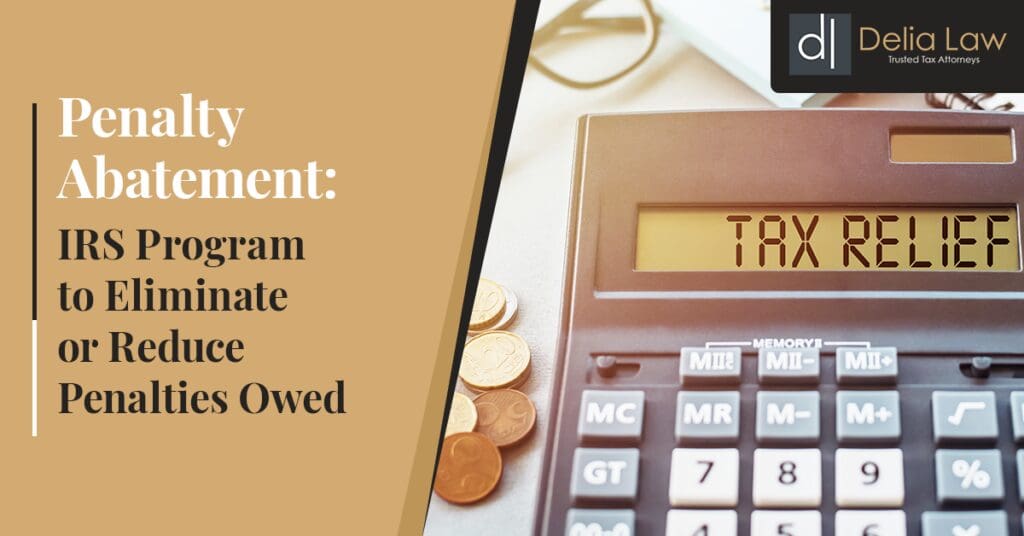The IRS expects all taxpayers to file and pay their taxes on time and in full. If an individual, couple, or business fails to do this, penalties and interest will be applied to the amount owed. If the amount remains unpaid, these penalties and interests can compound and increase the amount that you are liable for at an alarming rate.
Penalty abatement is an option for those who have overdue or unfiled taxes for the first time. If you qualify for this program, all or some of your penalty fees may be removed. Depending on your circumstances, this may make a drastic change in the amount that you owe.
Many people are unaware of the penalty abatement program and therefore do not take advantage of it. Our team at Delia Law is committed to empowering our clients with key tax law information, including details about penalty abatement and the ways to take advantage of the program if you are eligible.
IRS Penalties
Though there are many types of IRS penalties that a taxpayer may encounter, there are a few that are especially common.
If you fail to file your taxes at all, you will face a 5% monthly penalty on the amount that you owe. Though this can compound on itself, there is a maximum penalty of 25% monthly if you fail to file your taxes.
For example, if you owe $10,000 in taxes, $500 will be added to the amount owed monthly if you fail to file your taxes. Each month, the 5% will be calculated based on your new amount owed, which will include penalty fines from previous months.
If you file your taxes but fail to pay the amount that you owe, you face a .5% monthly penalty. Though this amount is much less significant than the fine for not filing your taxes, it is still impactful and should be resolved quickly.
For example, if you owe $10,000 in taxes, $50 will be added to the amount owed every month that you have not paid your taxes.
Finally, you may need to pay an estimated tax penalty if you did not allow for proper withholding or pay your estimated taxes due during the year. The amount of an estimated tax penalty is equal to the amount of interest that the money you owe would have accrued.
What Is Penalty Abatement?
Penalty abatement is a program that allows the IRS to eliminate or reduce penalties owed. You may only utilize this program if you have received an IRS penalty for the first time or if you can prove that you tried to pay your taxes but were unable to because of circumstances outside of your control. If you do not meet one or both of these criteria, the IRS will not consider your application for penalty abatement.
IRS delays or system errors are common examples of circumstances that may warrant penalty abatement. For example, if the IRS system takes several months to process your tax return and tries to charge you penalties for the delay, you can contact the IRS to ask for penalty abatement. The circumstances were outside of your control, and therefore you should not be subject to punitive action.
Requesting Penalty Abatement
If you wish to request a penalty abatement, you must fill out a waiver and submit it to the IRS. First Time Abate is appropriate for those who have not requested abatement in the past and is the most common way to request penalty abatement.
Your abatement request may be approved or resolved over the phone if you choose to call rather than submitting a waiver. If you do not wish to call, you will need to complete Form 843 and submit it to the IRS with a written statement.
Qualifying for First-Time Abatement
First-time abatement is the most common type of penalty abatement application, but not everyone qualifies. To be eligible, you must first be tax compliant. This means that you:
- Successfully filed returns of the same type over the last three years
- Have not received any penalties in the three years before your abatement request or had a penalty removed in an alternative abatement process (not first-time abate)
- Filed all returns or extension applications
- Have paid all of your taxes from past years or have a payment plan in place for the amounts owed, with the exception of the year for which you are requesting an abatement
If you are unsure about whether penalty abatement is an option for you or whether you qualify, you can speak to a qualified tax attorney from Delia Law about your situation.
Appeals
The IRS does not approve all requests for penalty abatement, regardless of the reason for or type of application. If the IRS denies your application, you have the option to file an appeal.
You should only explore an appeal if you are certain that you have applied for the correct form of abatement. In some circumstances, applicants are denied because they are more eligible for other forms of abatement or did not properly make their case for the type that they requested. Your first step should be to contact a tax attorney to discuss the type of penalty abatement for which you are applying.
If you have applied for the correct type of abatement with the proper information, you can move to make an appeal if the IRS rejects your decision. It is not advisable to attempt an appeal without the help of an attorney.
Interest
Overdue taxes are subject to interest as well as penalties. As penalties are applied, they begin to accrue interest as well.
If you have penalties abated or removed from your taxes, be sure to assess your interest owed. The IRS should remove interest requests on any penalties that they abate. Interest can be a significant cost, and it is important to explore whether yours can be reduced or eliminated as well.
Legal Representation for Penalty Abatement
It is common for penalty abatement applications to be denied due to an error or inaccuracy. To avoid this, it is helpful to work with a trained tax attorney to complete your request for penalty abatement.
Tax attorneys can do a great deal to help your application succeed. Not only do our tax professionals have an intimate knowledge of the application process and requirements, but we also understand common challenges and roadblocks that applicants face. Armed with this knowledge, we will take several steps to make your request successful.
- Some steps that we may take include:
Estimating your IRS tax interest and penalties owed - Discussing the circumstances of your finances
- Understanding the situation that kept you from paying what you owe
- Developing a method to achieve the most favorable possible abatement agreement with the IRS
To achieve these goals, we work closely with clients to fully understand their situations and needs. This enables us to create the most effective application possible for the given scenario.
Contact Delia Law
Our firm of tax attorneys can help you with your penalty abatement request, appeal, or questions. With representation from a qualified firm, you can explore all options available to you and ensure that you are not paying unnecessary fines or fees to the IRS.
For more or to schedule a consultation, contact Delia Law.










